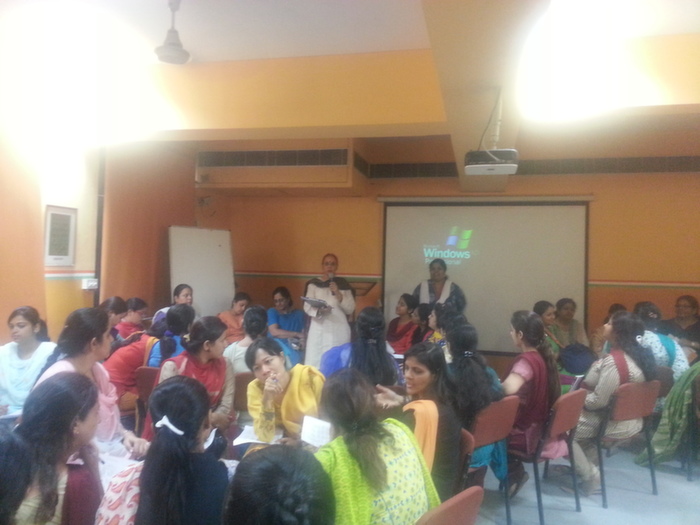Multiple Intelligences, a workshop for teachers.
Its not how smart you are but how you are smart.
A teachers' workshop on Multiple Intelligence was taken by the School counsellor, Ms. Sukhmeen Cheema. She was joined by teachers, Ms. Vandana Tewari and Ms. Abha Mishra in the audio visual room on 30th October, 2014.
The workshop started with a video giving a brief insight on the 8 intelligences advocated by specialist, Howard Gardner. The teachers were briefed about the multiple intelligence theory with the help of a power point presentation.
For years, teachers recognised that the traditional measures of intelligence, such as the IQ test, were reasonably good at predicting a student's school performance. However, in time, they realised that this did not accurately represent or assess the diversity of ways in which people learn.
[gallery columns="2"]
Gardner's 'Theory of Multiple Intelligences' encourages educators to start thinking of intelligence as a set of many different abilities and skills that help an individual learner comprehend, examine, and respond to different types of content. This helps to solve problems and/ or to devise something that is valued in one or more cultures . Dr Gardner suggests that each person possesses several [eight] Multiple Intelligences or ways in which individuals respond in different ways, to different kinds of content
1. Linguistic - Children with this kind of intelligence enjoy writing, reading, telling stories or doing crossword puzzles.
2. Logical-Mathematical - Children with logical intelligence are interested in patterns, categories and relationships. They are drawn to arithmetic problems, strategy-games and experiments.
3. Bodily-Kinesthetic- Such children process knowledge through bodily sensations. They are often athletic, dancers or good at crafts such as sewing or woodwork.
4. Spatial -These children think in images and pictures. They may be fascinated with mazes or jigsaw puzzles, or spending free time drawing, block-building or even day-dreaming.
5. Musical children are always singing or humming to themselves. They are usually quite aware of sounds that others may miss. These kids are often discriminating listeners.
6. Interpersonal Children who are leaders amongst their peers, who are good at communicating and who seem to understand others' feelings and motives possess interpersonal intelligence.
7. Intrapersonal -These children may be shy. They are very aware of their own feelings and are self-motivated.
8. Naturalist Intelligence - Ability to recognise and categorise plants, animals and other objects in nature
The teachers were oriented about the importance of assessing the multiple intelligence in all the students in the classroom through simple observation, school records, interaction with parents, students etc. Teaching aids like lesson plans should be only prepared keeping in mind all these intelligences. For example, there might be children in the classroom who are high on interpersonal intelligence; hence activities like peer-sharing, active discussion and interactions might work for them. However, at the same time there might be other students who might be high on intrapersonal intelligence, who would not be very active with classroom interaction; hence one needs to use 'one/ minute reflection' etc as a means of discovering oneself.
The workshop concluded with an interactive activity for teachers to help them understand the application of the 8 Multiple Intelligences in the classroom. Teachers formed groups department wise.
Each group was given a subject -related topic whose treatment had to be planned out on the basis of all 8 intelligences. They were then expected to present their ideas to the others.
Overall it was a highly interactive and application-based workshop.
Compiled by Ms. Sukhmeen Cheema and Ms. Vandana Tewari.













